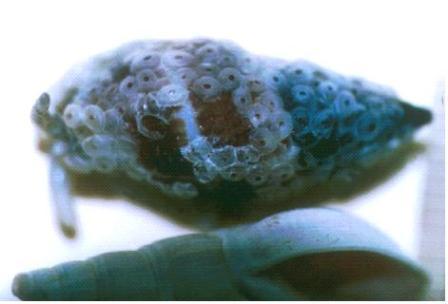Gastropoda (Mollusca)

Mollusks are among the most diverse groups on earth. Present in all aquatic environments and with an excellent fossil record, they are good subjects for ecological, faunal and systematic studies using fossil and living material. They are also used in climate change research to study how environmental changes impact life cycles, calcification of adults and larval shells, ‘invasiveness’ capabilities, etc.
(fig1)Above: Strombina lessepsiana from the Miocene Gatun formation (Panama) with a naticid drill hole.
(fig2)Below: Cosmioconcha modesta covered with egg capsules (eastern Pacific, Panama)
軟体動物は地球上で最も多様なグループの一つです。あらゆる水圏に生息するだけでなく卓越した化石記録をもつため、軟体動物は生態学・生物相研究・体系学のためのよい主題となります。生活史、成体と幼生における殻の石灰化、「侵襲性」能力などに対して環境変化がどのような影響を及ぼすのかを調べることで、軟体動物は気候変動研究にも用いられています。
(fig1)上: ストロムビナ・レッセプスィアーナ;パナマのガトゥン累層(中新世)産;タマガイ類によって穿孔されている。
(fig2)下: コスミオコンカ・モデスタ;卵嚢に覆われている;西太平洋、パナマ(エレーナ・フォルトゥナート)
